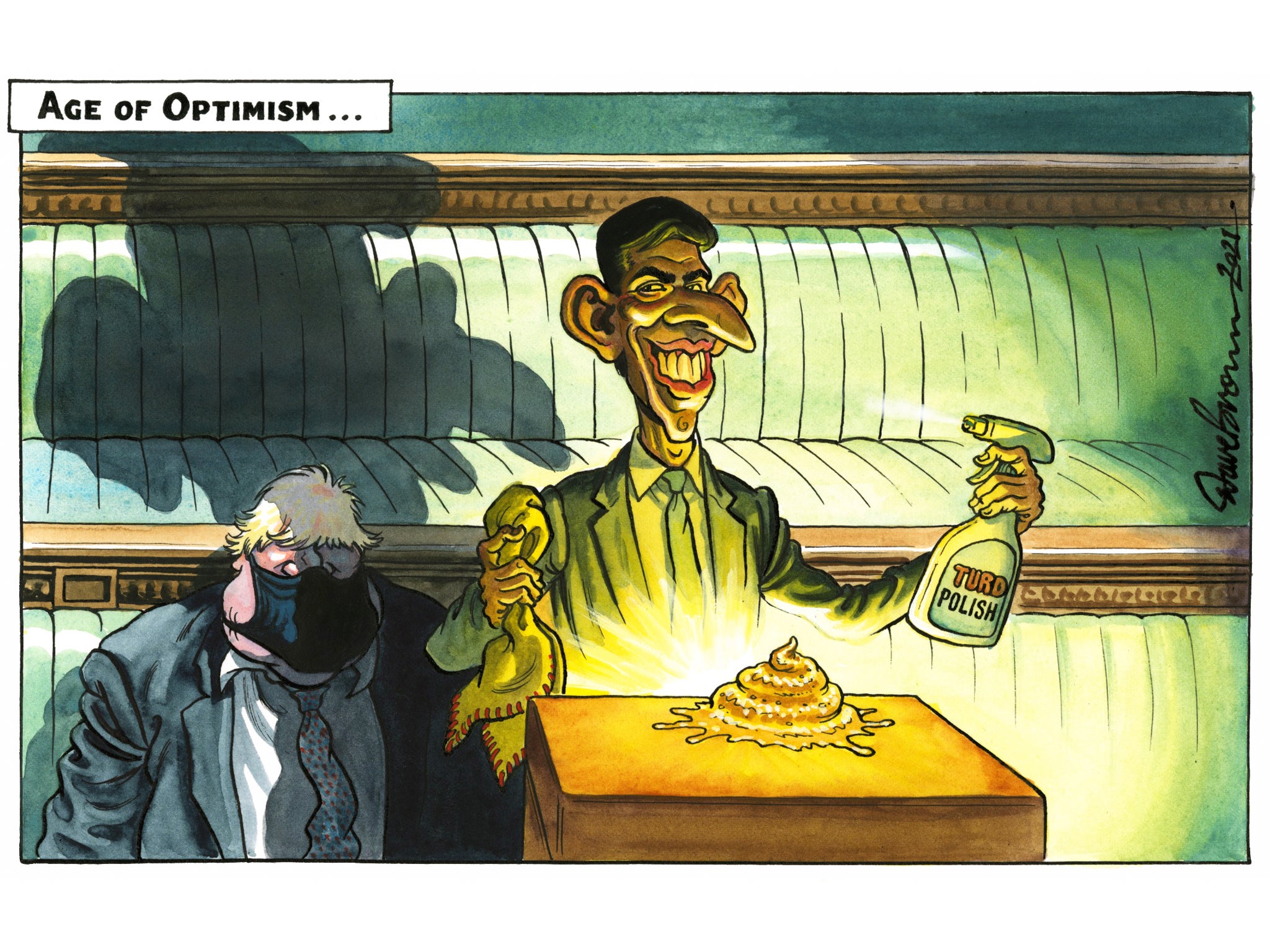There is no doubt that Rishi Sunak has a certain talent for presentation. In classic fashion, the chancellor has done what most of his predecessors have when they’ve found themselves in a tight fiscal corner – made the best of their limited options, offered something for everyone, and stealthily transferred the political and financial burden of repairing the public finances from Whitehall to local government.
From flights to regional airports to English sparkling wine, pubs to the merchant navy and investment in Stoke-on-Trent to the prospective restoration of overseas aid, there was scarcely a special interest left neglected. Including some of the lower paid who were granted a modest partial relief from the revisions to universal credit.
Nothing wrong with any of that, necessarily, but it made for an unrealistic boosterish view of the medium-term prospects for the economy and for the living standards of the British people – and still less for the environment and dealing with the climate crisis, the biggest factor in the quality of life for all.
As with all the worst Budgets, it feels pretty impressive on the day, but as the analysts grind their way through the welter of Treasury promises and Office for Budget Responsibility (OBR) forecasts, a much grimmer picture will start to emerge.
The Budget was surprisingly ungreen, given the backdrop of the Cop26 summit and the prime minister’s grand ambitions for success. Neither is making it cheaper for passengers to take domestic flights rather than the train the kind of thing that a responsible government that puts climate before politics would do.
The same goes for yet another postponement of a long-overdue rise in duty, which the chancellor seemed perversely pleased with. There was nothing for home insulation, nothing to bring the cost of electric cars closer to affordability, and nothing practical about speeding the replacement of gas boilers by a sceptical public. Above all, there was no plan to create jobs in the new green economy and the technologies that will enable the UK to live up to its obligations and ambitions.
Mr Sunak is fortunate that the economy is bouncing back more readily than the most gloomy of predictions – having suffered one of the deepest slumps among comparable economies – and he has some increased fiscal flexibility as a result. Nonetheless, the increase in employer and employee national insurance contributions will erode household incomes next year, as will the likelihood of higher interest rates and mortgage bills. Then there is also an increase in inflation and the continuing depressing effects of Brexit on inward investment and exports. If wages do rise faster than they did previously, this will not be because of higher productivity, and the government’s case that it will call forth increased output per worker is yet to be seen.
By the chancellor’s own witness, Britain is not about to become a powerhouse. After the economy returns to its pre-Covid levels of activity at the turn of the year, growth will, he states on the basis of the OBR’s work, soon slide back to rates that, in the recent past, would have been regarded as sluggish – 1.3 and 1.6 per cent a year, against the 2.5 per cent a year once thought to be the trend rate.
Brexit and thus the constricting the supply of labour, investment and markets to British business will continue to make its baleful presence felt for decades to come. The post-Brexit freedom to reduce the price of a pint for beer by 3p hardly makes up for such macroeconomic losses. The bald fact is that by the time of the next general election, living standards for many families in the UK will be barely higher than they were when David Cameron became prime minister in 2010, and in many areas public services will feel meaner and weaker too, even with the tax burden at its highest since 1949.
“Levelling up” is unlikely to live up to its inflated expectations. Wages seem doomed to fall behind inflation. That miserable squeeze on family budgets, the worst in decades, represents a great political opportunity for the opposition parties – provided that they can persuade the public that they have a plan.
There were measures in the Budget that deserve praise. The rationalisation of taxation on alcohol is welcome, though it should have been skewed upwards on public health grounds; and the various schemes to boost public and private investment are also desperately needed as business confidence has been shredded by Brexit and Covid.
The hospitality and culture sectors deserve some tax breaks, and relaxing visa requirements for migrants is always a good idea in an economy short of all kinds of workers. Yet they cannot compensate for the transcendent failures to invest in a world-class green economy and place the UK in a position of global leadership. On the climate crisis, above all, this Budget was yet another missed opportunity.




Join our commenting forum
Join thought-provoking conversations, follow other Independent readers and see their replies
Comments